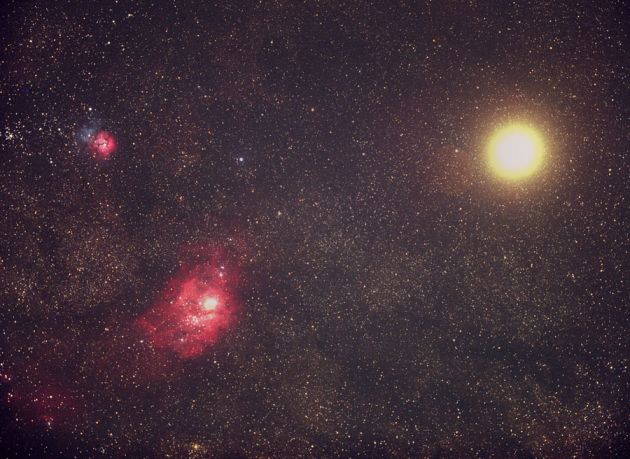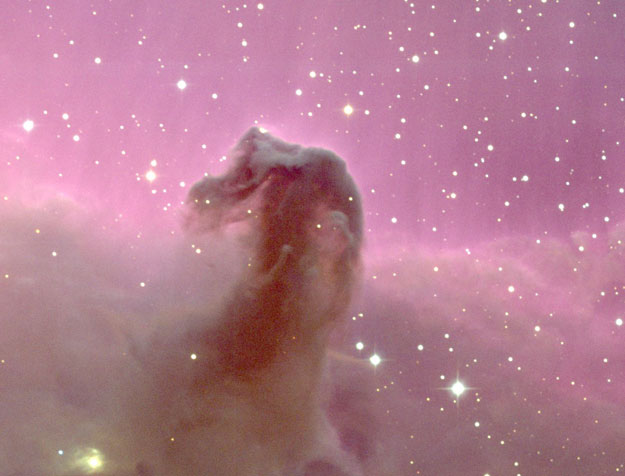Important MessageYou are browsing the archived Lancers Reactor forums. You cannot register or login. |
the astronomer
This is where you can discuss your homework, family, just about anything, make strange sounds and otherwise discuss things which are really not related to the Lancer-series. Yes that means you can discuss other games.
27 posts
• Page 2 of 2 • 1, 2
::update::
Messiers and Mars

Credit & Copyright: Michael Cole
Explanation: A telescopic tour of the constellation Sagittarius offers the many bright clusters and nebulae of dimensioned space in a starscape surrounding the galactic center. This gorgeous color deep-sky photograph visits two such lovely sights, cataloged by the 18th century cosmic tourist Charles Messier as M8 and M20. M20 (upper left), the Trifid Nebula, presents a striking contrast in red/blue colors and dark dust lanes. Just below and to the right is the expansive, alluring red glow of M8, the Lagoon Nebula. Both nebulae are a few thousand light-years distant but at the far right, the dominant celestial beacon is a "local" source, the planet Mars. Just passing through Sagittarius and strongly overexposed in this picture, the Red Planet was a short 4 light-minutes away. Now headed for its closest approach to planet Earth in recorded history, Mars rises in the east southeast by midnight shining brightly at about -1.4 magnitude. Urban imager Michael Cole recorded this photograph at 3:00 AM on May 20th, 2001 in clear skies over Camp Hancock, Oregon, USA.
the astronomer
Messiers and Mars

Credit & Copyright: Michael Cole
Explanation: A telescopic tour of the constellation Sagittarius offers the many bright clusters and nebulae of dimensioned space in a starscape surrounding the galactic center. This gorgeous color deep-sky photograph visits two such lovely sights, cataloged by the 18th century cosmic tourist Charles Messier as M8 and M20. M20 (upper left), the Trifid Nebula, presents a striking contrast in red/blue colors and dark dust lanes. Just below and to the right is the expansive, alluring red glow of M8, the Lagoon Nebula. Both nebulae are a few thousand light-years distant but at the far right, the dominant celestial beacon is a "local" source, the planet Mars. Just passing through Sagittarius and strongly overexposed in this picture, the Red Planet was a short 4 light-minutes away. Now headed for its closest approach to planet Earth in recorded history, Mars rises in the east southeast by midnight shining brightly at about -1.4 magnitude. Urban imager Michael Cole recorded this photograph at 3:00 AM on May 20th, 2001 in clear skies over Camp Hancock, Oregon, USA.
the astronomer
sorry for taking so long to post again.. just busy with finals.. in fact. they are closer than ever.. but seeing this, couldn't pass it up.
The Horsehead Nebula

Explanation: One of the most identifiable nebulae in the sky, the Horsehead Nebula in Orion, is part of a large, dark, molecular cloud. Also known as Barnard 33, the unusual shape was first discovered on a photographic plate in the late 1800s. The red glow originates from hydrogen gas predominantly behind the nebula, ionized by the nearby bright star Sigma Orionis. The darkness of the Horsehead is caused mostly by thick dust, although the lower part of the Horsehead's neck casts a shadow to the left. Streams of gas leaving the nebula are funneled by a strong magnetic field. Bright spots in the Horsehead Nebula's base are young stars just in the process of forming. Light takes about 1500 years to reach us from the Horsehead Nebula. The above image was taken with the 0.9-meter telescope at Kitt Peak National Observatory.
Science is knowledge.
Knowledge is power.
Time is money.
power = work/time
therefore, knowledge= work/money
therefore, money = work/knowledge
therefore, money is inversely proportional to knowledge.
therefore,
The more knowledge you have, the less money you have.
Prepare for the worst, for you have read the worst.
The Horsehead Nebula

Explanation: One of the most identifiable nebulae in the sky, the Horsehead Nebula in Orion, is part of a large, dark, molecular cloud. Also known as Barnard 33, the unusual shape was first discovered on a photographic plate in the late 1800s. The red glow originates from hydrogen gas predominantly behind the nebula, ionized by the nearby bright star Sigma Orionis. The darkness of the Horsehead is caused mostly by thick dust, although the lower part of the Horsehead's neck casts a shadow to the left. Streams of gas leaving the nebula are funneled by a strong magnetic field. Bright spots in the Horsehead Nebula's base are young stars just in the process of forming. Light takes about 1500 years to reach us from the Horsehead Nebula. The above image was taken with the 0.9-meter telescope at Kitt Peak National Observatory.
Science is knowledge.
Knowledge is power.
Time is money.
power = work/time
therefore, knowledge= work/money
therefore, money = work/knowledge
therefore, money is inversely proportional to knowledge.
therefore,
The more knowledge you have, the less money you have.
Prepare for the worst, for you have read the worst.
Jesus H. Christ guys!!
Can we please put links in the messages instead of the pictures themselves please? Remember, less than 1/2 of the people that come here are on braodband and the machine this server sits on is not state of the art. Lets be respectful and thoughtful of others (and the owner of the website) in general when posting.
Even my DSL bogged momentarily.
Rob "Stinger" Lordier
Moderator - Lancers Reactor
Creator Privateer FAQ
Webmaster - My current hobby/project
no good deed will ever go unpunished
Co-Admin Elite Freelancer Server
Can we please put links in the messages instead of the pictures themselves please? Remember, less than 1/2 of the people that come here are on braodband and the machine this server sits on is not state of the art. Lets be respectful and thoughtful of others (and the owner of the website) in general when posting.
Even my DSL bogged momentarily.
Rob "Stinger" Lordier
Moderator - Lancers Reactor
Creator Privateer FAQ
Webmaster - My current hobby/project
no good deed will ever go unpunished
Co-Admin Elite Freelancer Server
Although my modem is screaming in pain(Lucent/Agere 56k soft), it took 3-4 secs to load the first page of this thread (20 posts/page). It depends on the server(s) more than on the client (at least in my case), so think of this as a divided-opinions-type-authority-statement-killer 
p.s. 13:00-15:00 CET, 20:00-22:00, and 00:30-02:30 is a hair-pulling expirience, I try to avoid connecting at those times, 'cause it takes 1 sec per 1 line of text...
Edited by - Chetnik on 14-07-2003 08:42:30
p.s. 13:00-15:00 CET, 20:00-22:00, and 00:30-02:30 is a hair-pulling expirience, I try to avoid connecting at those times, 'cause it takes 1 sec per 1 line of text...
Edited by - Chetnik on 14-07-2003 08:42:30
27 posts
• Page 2 of 2 • 1, 2


